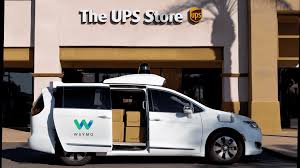Waymo is coming together with UPS to experiment with the use of its self-driving vans in moving packages.
Waymo, the self-driving wing of Google’s (GOOG) parent company Alphabet, will use its autonomous Chrysler Pacifica minivans to transport packages from UPS stores in the Phoenix area to a UPS sorting facility in Tempe, Arizona. (Note: It will not be delivering packages to customers’ doorsteps.) The tests will start in the upcoming weeks and last for numerous months. Waymo will have a driver aboard to check the vehicle and handle the van if needed.
Waymo and UPS (UPS) refused to reveal any financial details of the partnership, other than to say Waymo will be paid. They also did not tell how many packages would be transported during the testing period.
As competitor Amazon (AMZN) continues to create its own leading-edge logistics network, UPS and FedEx have gradually embraced new delivery technologies, such as drones, self-driving cars and delivery robots.
As with any acceptance of automated technologies, concerns about job losses arise. A UPS representative said that the company values its employees and considers autonomous technologies as a complement to its human workers.
Bala Ganesh, who manages the UPS advanced technologies group, said that using a Waymo van will be more useful than using a traditional human-driven UPS truck. The Waymo self-driving vans may sit inactive for extended periods between trips at the UPS facilities, which is a fruitless use of drivers’ time, he said.
Since it was first introduced as Google’s self-driving car project in 2009, Waymo has been primarily focused on transporting people. But it has lately branched into deliveries, which provides another business prospect and maybe a faster path to market. It’s easier to transport a box than a human being. By carrying packages, there’s no moral dilemma about whether to program the car to prioritise the safety of a human passenger over a foot-traveller, for instance.
Waymo started delivering car parts among the Phoenix branches of auto retailer AutoNation a few months ago. It’s also deploying its self-driving software on long-haul trucks, including in Texas and New Mexico.
Usually, the self-driving industry has missed its time limit as it tries to build safe vehicles and gain the consent of regulators. The software and hardware driving an autonomous vehicle is also extremely complicated.
Waymo is widely considered as the self-driving company with the most advanced technology. It presently runs a limited self-driving ride service in the Phoenix area that has given over 100,000 rides since 2017.
“Waymo provides a beacon of autonomous capability and progress,” said Tasha Keeney, who evaluates autonomous vehicles at the investment firm Ark Invest. “They prove that technological progress is possible.”

